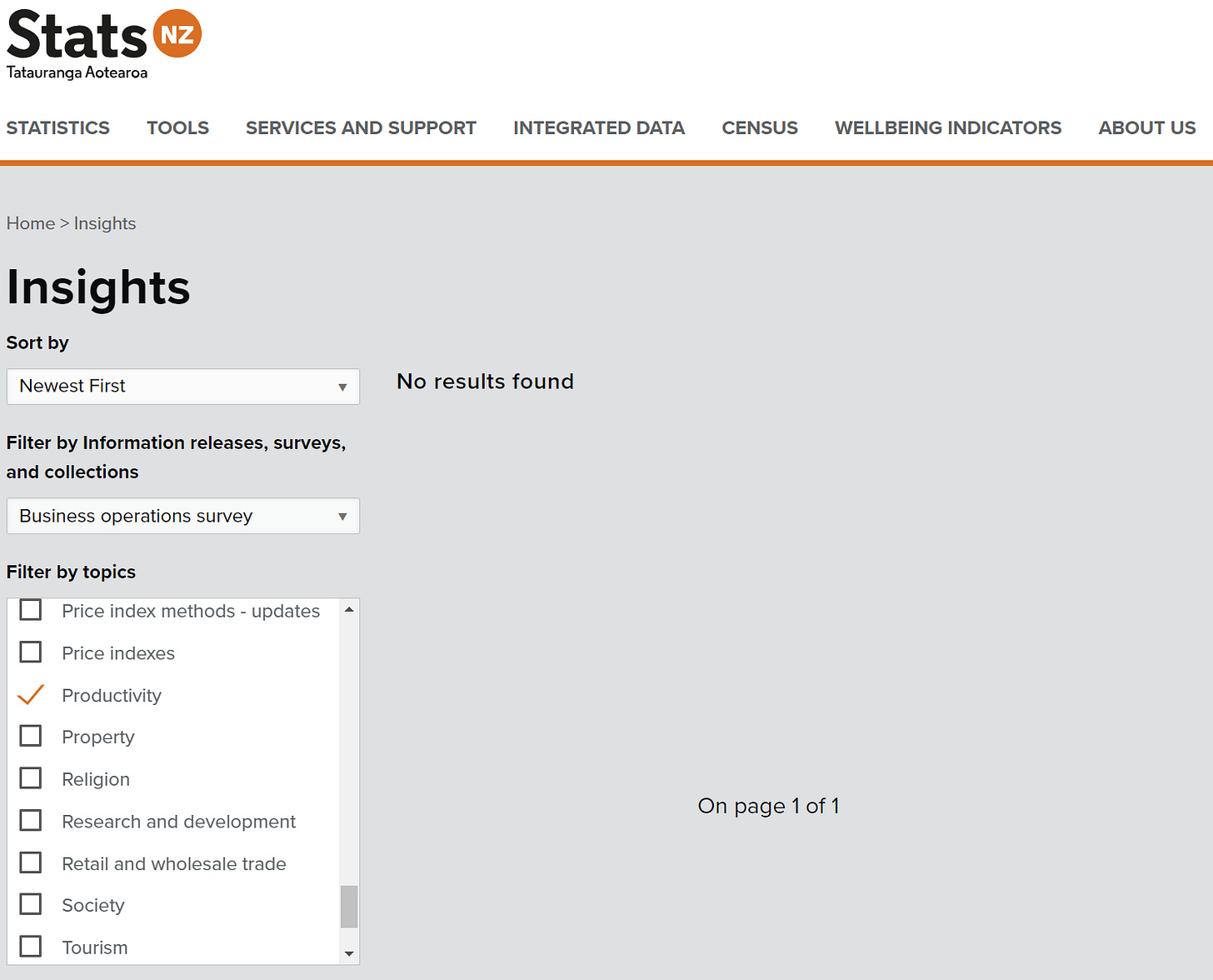What’s the most productive way to improve NZ’s productivity?🍋
Wasn't that the Productivity Commission’s only job?
Recent news about the New Zealand Productivity Commission (NZPC) being wound down and Dave’s post about it got me thinking back to the time I spent working at the Commission in its very early days.
What was the Productivity Commission’s job?
One of the things I found surprising was that improving NZ’s productivity was not, at least then, a key performance indicator (KPI) for the NZPC — even though, based on its name, you might think that was its only job.
Instead, the idea was that the Commission would:
produce reports summarising research and analysis about productivity or its antecedents in various sectors and the country overall;
hope that those might inform legislation or regulations;
hope that those might then influence organisational decision-making; and
hope that would then eventually flow through to an effect on productivity.
Unfortunately, as the Commission’s own publications show, the period in which the NZPC existed coincides with New Zealand’s lowest productivity growth in decades. That is in spite of the fact that the people working on those reports were smart and hard-working, and the reports themselves were well-regarded by many of those who read them.

The thing is, I’m guessing that most of the people who read those reports were not the people whose behaviour they were intended to change. I’ve long held a similar concern about academic research produced by people working in business schools. Once again, smart people work hard doing careful analysis to produce articles that are published in academic journals, which are largely read by other academics rather than by the people whose behaviour they are in theory meant to influence, though rarely do in practice.
I question whether economists talking to, and writing for, other economists — or academics talking to, and writing for, other academics — is the most productive way to improve NZ’s productivity.
The legislation creating the NZPC listed these functions:
a) on referral to the Commission by the responsible Minister in conjunction with the relevant portfolio Ministers (collectively, the referring Ministers), to hold inquiries and report to the referring Ministers about productivity-related matters; and
b) on its own initiative, to—
(i) undertake and publish research about productivity-related matters; and
(ii) promote public understanding of productivity-related matters.
Yet, based on what I saw during my time at the Commission and observed subsequently, of those three stated functions, relatively little attention was given to “promoting public understanding of productivity-related matters.” The NZPC does have a Productivity by the numbers section on its website. It provides a high-level description and links to a spreadsheet with the high-level data shown in numerous tabs, but that data appears to be far too general to inform anyone about what they might be able to do to improve productivity within their own organisation.
For example, Productivity by the Numbers discusses the importance of R&D as a driver of innovation. There is strong evidence for that at the aggregate level, but for individual organisations R&D and innovation are not generic things. Organisations need to make specific decisions about which particular R&D initiatives to engage in, out of a more or less infinite number of possibilities, and how. Some investments in R&D will yield outstanding results while others will not, yet the information provided does not help to differentiate which is which, to inform those more specific decisions.
Retirement Commission comparison
Consider how that compares to the Retirement Commission, which is also an independent commission. It also provides policy-related advice, but seems to have much more thoroughly embraced the part of its stated function to:
promote education, and publish information, about financial matters to assist individuals to make financial decisions confidently and informedly.
That includes creating a whole web-site (https://sorted.org.nz) aimed at helping individuals make good financial decisions, including providing a variety of tools and planners, which many people do use for things such as informing decisions related to retirement planning.
So why did the NZPC give less emphasis to the part of its stated function about promoting public understanding than the Retirement Commission did? In fairness, the Retirement Commission’s legislation does explicitly talk about assisting individual decision making, but it’s hard to imagine what the point of promoting public understanding of productivity-related matters would have been if not to assist individual (and organisational) decision making.
I do recall hearing my colleagues at the NZPC talk about not being consultants. That’s a point I’ve heard academic colleagues make previously too. But that perspective ignores the fact that there is a big difference between providing direct advice about what a particular organisation should do in a specific situation, and providing empirical evidence many organisations can incorporate into their decision-making processes. It also ignores the fact that NZ has many organisations that are too small to be able to afford to hire consultants to help them improve their productivity. Furthermore, the quality of the advice available from consultants (for those who can afford them) is a function of the empirical evidence available to the consultants.
All of that begs the question of who in New Zealand is providing that type of information when it comes to productivity specifically as well as other information that would help NZ organisations improve their productivity. To the extent that information is being provided, it raises a question of whether it’s sufficient. Let’s consider other possible sources of information.
Statistics New Zealand as a source of productivity-related information
Statistics New Zealand initially seems like a promising source. They have a business section on their website, and that page lists sources and says: “These statistics can help you make business decisions, develop policy, or compare your business with others.” Excellent!
However, if you click on the source that seems most relevant to productivity (the Business Operations Survey) and then filter by productivity, it yields literally no results. The same thing happens if you filter by information and communication technology (ICT), which is often considered to be a driver of productivity.
If you click around a bit (which I suspect few people trying to improve the productivity of their organisations have time to do, and in itself is kind of unproductive), you can eventually find a spreadsheet that aggregates results of the Business Operations Survey by things like industry and business size. However, the information provided generally describes what percentage of organisations do different things (e.g. have a web presence or ICT security). That’s not particularly helpful for a business trying to make specific decisions intended to improve their productivity without data about who took what action being analysed in conjunction with outcome-related data, such as profitability, revenue per employee, etc.
IRD as a source of productivity-related information
The Inland Revenue Department (IRD) does have outcome-related data, and they make industry financial data and benchmarks available in collaboration with Statistics New Zealand. That would enable a business to understand whether things such as their return on assets and gross profit ratio are above or below average for their particular size and industry. But it still would not help them figure out which particular actions could help them improve their absolute or relative position, or their productivity. The Longitudinal Business Database does have data on both business practices and business financials/outcomes, but most businesses do not have access to that and many probably also lack staff with the capabilities required to use it even if they had access.
MBIE as a source of productivity-related information
The Ministry of Business, Innovation and Employment (MBIE) has some information linking business practices to productivity, but it’s not particularly easy to find because it’s mixed in with a lot of other things, including outputs from the NZPC and government responses to them. I found a report linking ICT use and productivity, but it pooled all ICT, and so would not help an organisation trying to decide if adopting a particular ICT technology or practice would improve their productivity (or not).
Academics in business schools as a source of productivity-related information
A search of Google Scholar revealed an initially promising 24,400 hits for the terms “productivity” and “New Zealand”. A business person who had the time to take a closer look at those would be in luck if he or she were interested in agricultural productivity. There are a lot of empirical articles discussing specific aspects of that, which seem unlikely to change in the time it would take to collect the data, analyse it, and publish the article.
Outside of agriculture, there appear to be far fewer empirical articles relating specific actions to productivity or related organisational-level measures such as profitability. Even if there were, such articles are not easy for the average business person to access and read. Furthermore, the articles may not be practically useful by the time they are published given the cadence of academic publishing normally does not match the cadence of business decision making.
Consultants or other companies as a source of productivity-related information
In larger markets, such as the US, consulting firms sometimes proactively do research about specific technologies or sectors and make their findings publicly available for free in the hope of establishing thought leadership that will help attract clients for paid engagements. Unfortunately, the cost of doing research like that in NZ is not much different than in a large market like the US, but the potential to monetise it is much lower, and therefore it’s not something you often see here.
Xero would be well-positioned to do this type of thing since it already has relationships with a large number of organisations and has easy access to their data (if they could get permission to use it for this purpose); however, as it internationalises, it appears to be less focused on the NZ market than it once was.
It would be more productive to have a single source of easily accessed and specific empirical evidence about productivity
As I hope the previous discussion shows, a New Zealander genuinely wanting to improve his or her organisation’s productivity would have a hard time finding clear evidence for the best ways to do that — unless they happened to be a farmer who is comfortable reading academic journals. The evidence that exists is all over the place, and much of it is not sufficiently specific to aid organisational decision-making. It is also not presented in a user-friendly way for people who are not economists, academics, statisticians, or data scientists.
I hoped the Productivity Commission would be that single source of information when it started. Now that it’s ending, I hope someone else will take up that challenge. It would be great to see a productivity-oriented website for organisations that is as useful as sorted.org.nz is for individuals.
If and when someone does take on that challenge, I hope they will start by asking the people whose behaviour needs to change to improve NZ’s productivity what would be helpful to them. That’s because even with the best will in the world people working in government and academic institutions who think about productivity at an aggregate and theoretical level are not likely to understand the day-to-day granular decisions facing individual people that eventually aggregate up into the productivity statistics. In my opinion, getting them the information they need to inform those decisions in the way they want to consume that information would be a more productive way to improve productivity
By Mary Ellen Gordon









There are many rich insights in this article. In our own productivity work with the Our Land and Water National Science Challenge, the AERU was supported to engage with research users at every stage. This included working with Vincent Heeringa to produce the resources now on the Value Project website: https://ourlandandwater.nz/the-value-project/.
If you replaced the word productivity by demography you would find a similar disconnection between analysis and action. Maybe we have a quantitatively ignorant and disconnected policy community which is replicated in other places.